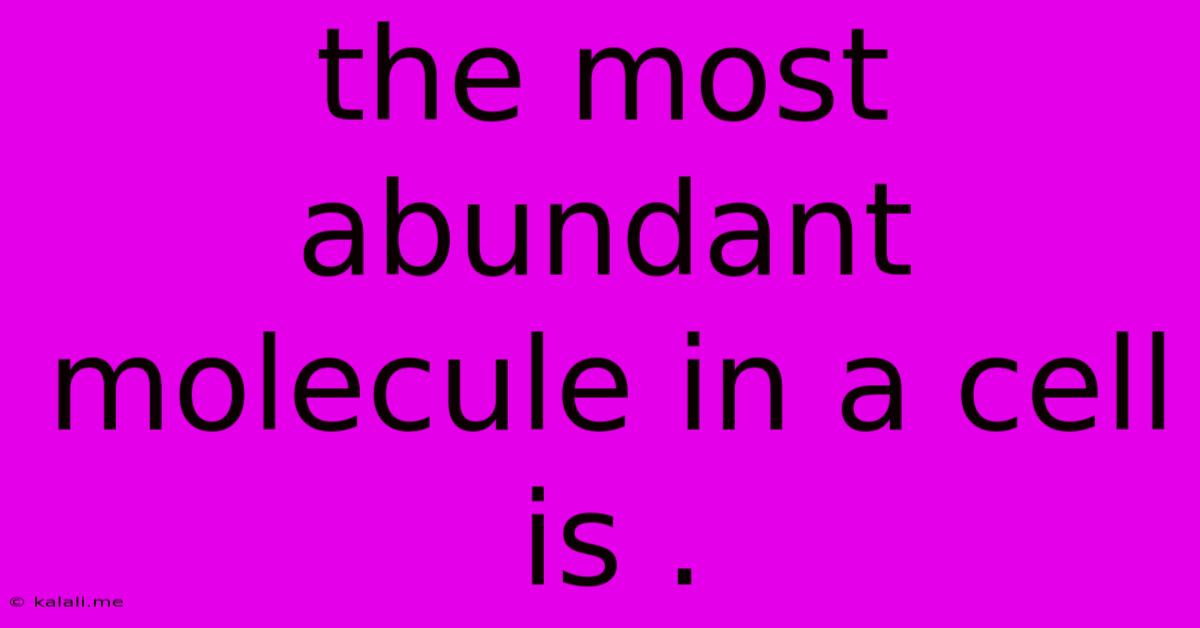The Most Abundant Molecule In A Cell Is .
Kalali
Jun 15, 2025 · 3 min read

Table of Contents
The Most Abundant Molecule in a Cell: Water's Crucial Role
Water. It's not just essential for life on Earth, it's the most abundant molecule within the cells that make up all living things. This seemingly simple molecule plays a complex and crucial role in cellular function, impacting everything from structure to metabolism. This article will delve into the significance of water's abundance in cells and explore its multifaceted contributions to cellular processes.
Why is water so prevalent in cells? Its unique properties make it the perfect solvent and medium for biological reactions. Water's polar nature, with its slightly positive and negative ends, allows it to interact with many other polar molecules, dissolving them effectively. This is crucial because cellular processes rely on dissolved molecules moving and interacting within the cell.
Water's Essential Roles in Cellular Function
Water's abundance isn't just a coincidence; it's vital for a wide array of cellular functions. Let's explore some key roles:
-
Solvent for biochemical reactions: Many biochemical reactions, such as enzyme-catalyzed processes, occur in an aqueous environment. Water acts as a solvent, dissolving reactants and facilitating their interaction. This includes processes like protein folding, DNA replication, and cellular respiration.
-
Maintaining cellular structure: Water contributes significantly to the turgor pressure within plant cells, providing structural support. In animal cells, water maintains cell volume and shape, preventing collapse. The hydrophilic and hydrophobic interactions of water with cellular components are crucial for maintaining the integrity of membranes and organelles.
-
Transport medium: Water serves as a transport medium for nutrients, waste products, and signaling molecules within the cell and between cells. This includes the movement of ions, sugars, and amino acids through various transport mechanisms across cell membranes.
-
Temperature regulation: Water's high specific heat capacity helps to regulate cell temperature, preventing drastic fluctuations that could damage cellular components. This thermal buffering capacity is crucial for maintaining optimal conditions for enzyme activity and other cellular processes.
-
Participant in biochemical reactions: Water is not only a passive participant; it directly participates in numerous biochemical reactions, such as hydrolysis reactions where water molecules are used to break down larger molecules into smaller ones. This is fundamental to digestion and metabolism.
Beyond Water: Other Abundant Molecules
While water reigns supreme, other molecules contribute significantly to the cell's composition. These include:
-
Proteins: Essential for a vast array of cellular functions, including structural support, enzymatic activity, and transport.
-
Lipids: Primarily found in cell membranes, lipids form a crucial barrier separating the cell's interior from its surroundings. They also serve as energy storage molecules.
-
Carbohydrates: These provide energy and play structural roles in cell walls (plants) and extracellular matrices.
-
Nucleic acids (DNA and RNA): These store and transmit genetic information, guiding cellular processes and heredity.
Understanding the abundance and roles of water in cells is paramount to understanding life itself. Its unique properties and multifaceted contributions underpin the very foundation of cellular processes, making it the undisputed most abundant molecule within the cellular environment. Further research continues to unravel the intricate ways in which water interacts with other cellular components, contributing to our ever-expanding knowledge of cell biology and biochemistry.
Latest Posts
Latest Posts
-
Which Of The Following Are Balanced Equations
Jun 15, 2025
-
Group Of Stars That Form A Pattern
Jun 15, 2025
-
Which Of The Following Is True About Science
Jun 15, 2025
-
Parts Of A 3 Phase Motor
Jun 15, 2025
-
First 18 Elements Of Periodic Table
Jun 15, 2025
Related Post
Thank you for visiting our website which covers about The Most Abundant Molecule In A Cell Is . . We hope the information provided has been useful to you. Feel free to contact us if you have any questions or need further assistance. See you next time and don't miss to bookmark.